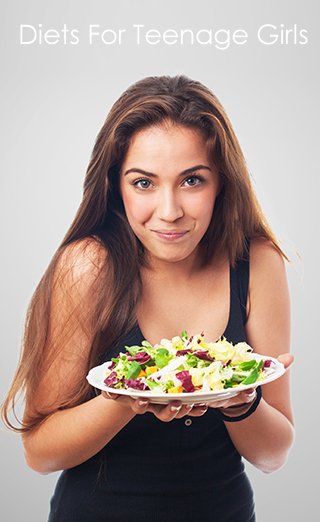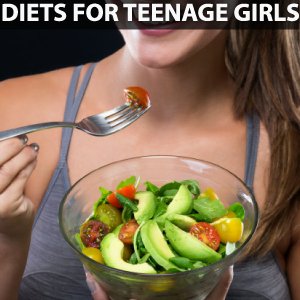Maintaining a healthy diet is crucial for the growth and development of teenage girls. With increasing reports of diseases such as coronary heart disease, cancer, eating disorders, and stroke, it is essential to focus on healthy eating habits that include iron supplements, vitamins, and minerals. These nutrients promote healthy living during childhood and adolescence and have long-term benefits. This article provides insights into a balanced diet for teenage girls aiming to lose weight while ensuring overall health and well-being.

Understanding Teenage Girls’ Nutritional Needs
Teenage girls, aged 13 to 19, undergo significant physical and intellectual development. This age group is particularly sensitive, requiring careful attention to their eating habits. In the United States, teenage girls often consume sugar-sweetened beverages, soft drinks, refined grains, and foods high in saturated and trans fats, leading to various health issues such as anemia, obesity, eating disorders, high blood pressure, and cancer.
Common Health Problems Among Teenage Girls
Anemia
Anemia, particularly iron deficiency anemia, is common among teenage girls in the U.S. This condition occurs due to a lack of red blood cells, often caused by inadequate iron intake. Monthly menstruation exacerbates this deficiency, leading to symptoms like tiredness, headaches, and dizziness. Therefore, iron-rich foods are essential for teenage girls to replenish red blood cells and maintain energy levels.
Foods to Combat Anemia:
- Lean Meats, Poultry, and Fish: These are excellent sources of heme iron, which is easily absorbed by the body. Consuming these foods two or three times a week can help maintain healthy iron levels.
- Iron-Fortified Cereals: Starting the day with iron-fortified cereals like oatmeal or bran flakes can significantly boost iron intake.
- Dried Fruits: Apricots, raisins, and prunes are rich in non-heme iron, which, although not as easily absorbed as heme iron, is still beneficial. Pairing these with vitamin C-rich foods can enhance iron absorption.
- Leafy Green Vegetables: Spinach, broccoli, kale, and asparagus are excellent sources of iron and should be included in daily meals.
- Whole Grains: Foods like brown rice, wheat bread, and oatmeal provide iron and other essential nutrients like fiber and folic acid.
- Eggs: Eggs are naturally healthy foods and two eggs provide about 2 milligrams of iron, making them a great addition to a teenage girl’s diet.
- Beans: Black beans, white beans, lentils, and black-eyed peas are rich in iron, protein, and fiber, contributing to overall health.
Obesity
Obesity is a growing concern in the U.S., with about 17% of children and teenagers being classified as obese. Poor eating habits, lack of physical activity, and genetic factors contribute to this condition, which increases the risk of heart disease, high blood pressure, hormonal imbalances, joint pain, diabetes, depression, and anxiety.

Foods to Combat Obesity:
- Fruits and Vegetables: These are low in calories and high in vitamins, minerals, and antioxidants. Including a variety of fruits like bananas, apples, strawberries, and oranges, and vegetables like kale, spinach, beans, and cabbage can help manage weight.
- Fiber-Rich Foods: High-fiber foods aid in digestion and help maintain a feeling of fullness, reducing overall calorie intake. Foods like whole grains, beans, and vegetables are excellent sources of fiber.
- Water: Staying hydrated is crucial for overall health. Drinking at least 8 glasses of water a day helps ward off fatigue, keep hunger at bay, and boost metabolism.
- Avoid Processed and Junk Foods: Processed foods often contain high levels of sugar, sodium, and unhealthy fats. Teenage girls should limit their intake of soft drinks, sugar-sweetened foods, and fast food.
Tips for Weight Loss in Teenage Girls
Healthy Food Choices
Making healthy food choices is essential for weight loss and overall well-being. Here are some tips:
- Eat Balanced Meals: Ensure that each meal includes a balance of protein, carbohydrates, and fats. Incorporate fruits, vegetables, whole grains, and lean proteins into every meal.
- Portion Control: Be mindful of portion sizes to avoid overeating. Using smaller plates can help control portion sizes.
- Healthy Snacks: Choose healthy snacks like fruits, nuts, and yogurt instead of sugary or salty snacks.
Physical Activity
Regular physical activity is crucial for weight loss and maintaining a healthy weight. Encourage teenage girls to engage in activities they enjoy, such as:
- Sports: Participating in school sports teams or community leagues.
- Exercise: Incorporating regular exercise routines, such as jogging, swimming, or yoga.
- Active Hobbies: Engaging in hobbies that involve physical activity, like dancing, hiking, or cycling.
Addressing Common Health Issues
Eating Disorders
Eating disorders, such as anorexia nervosa, bulimia nervosa, and binge-eating disorder, are significant health complications that can have severe physical and mental health consequences. It is crucial to address these disorders early and provide appropriate treatment and support.
- Anorexia Nervosa: Characterized by severe restriction of food intake due to an intense fear of gaining weight. Treatment includes medical intervention, nutritional counseling, and psychological support.
- Bulimia Nervosa: Involves cycles of binge eating followed by purging. Treatment focuses on breaking the binge-purge cycle and establishing healthy eating patterns.
- Binge-Eating Disorder: Involves eating large quantities of food in a short period without purging. Treatment includes counseling and developing healthy eating habits.
Sleep Disorders
Adequate sleep is essential for overall health and well-being. Sleep deprivation can lead to various health issues, including obesity, depression, and anxiety. Teenage girls should aim for 7-8 hours of sleep per night.
Foods to Promote Better Sleep:
- Walnuts: Contain omega-3 fatty acids that improve the central nervous system and enhance sleep quality.
- Almonds: Provide essential nutrients like copper, zinc, and magnesium that help reduce fatigue and improve sleep conditions.
- Cherry Juice: Boosts melatonin levels, helping to regulate sleep patterns.
- Honey: Natural sugar in honey increases insulin levels slightly, allowing tryptophan to enter the brain and promote restful sleep.
- Cheese: Rich in calcium, which helps the brain use tryptophan to produce sleep-enhancing melatonin.
Finishing Touch
Eating the right foods and maintaining a balanced diet are crucial for the health and well-being of teenage girls. A focus on iron-rich foods, fruits, vegetables, and whole grains can help prevent common health issues like anemia and obesity. Encouraging regular physical activity and addressing any eating or sleep disorders early can significantly improve a teenage girl’s quality of life. By following these guidelines, teenage girls can achieve a healthy weight, enhance their overall health, and enjoy a happier, more active lifestyle.
